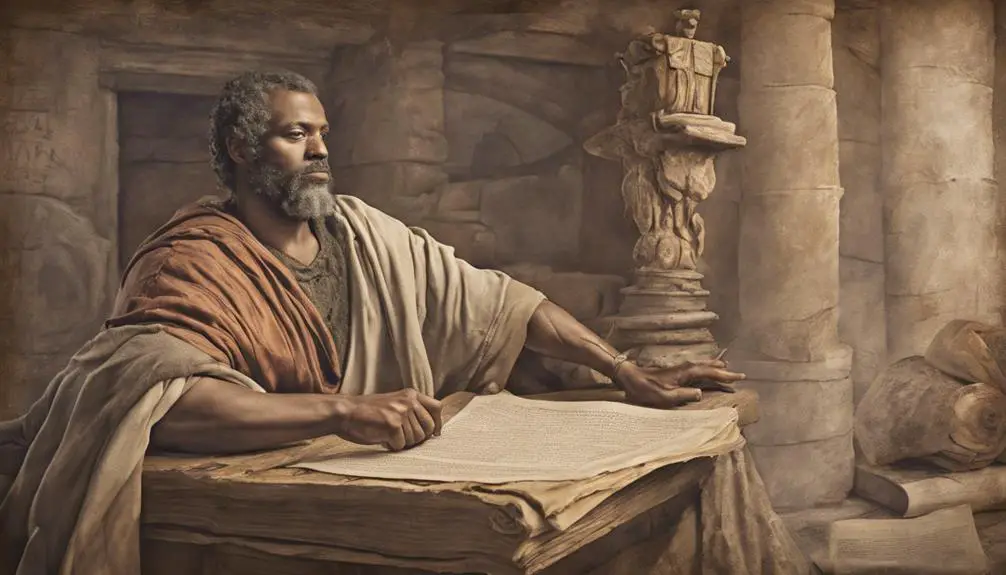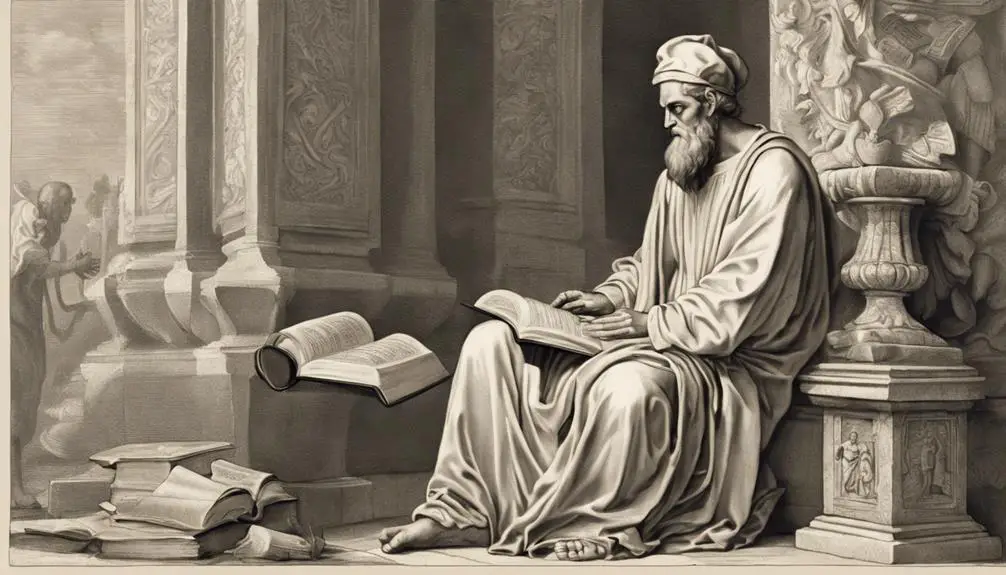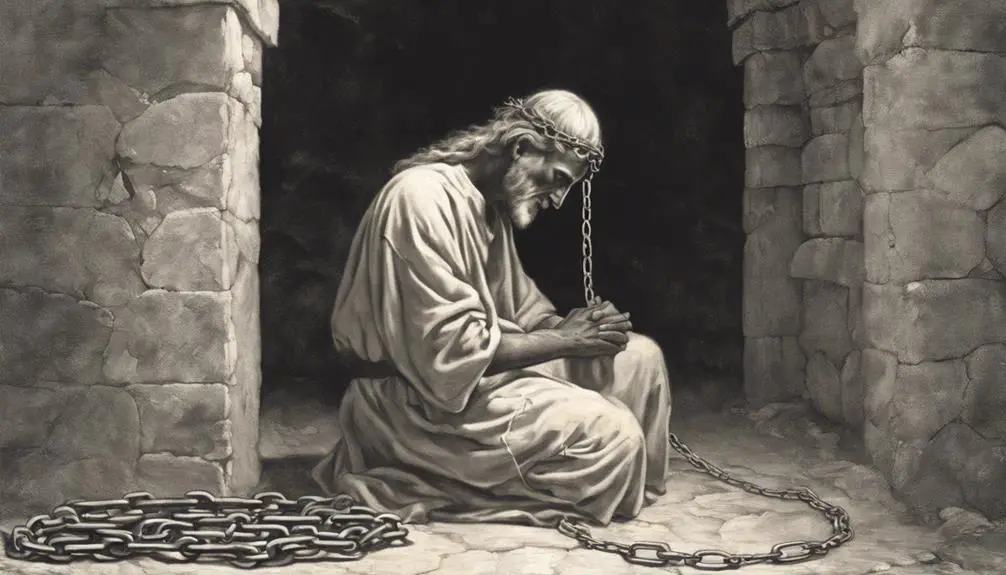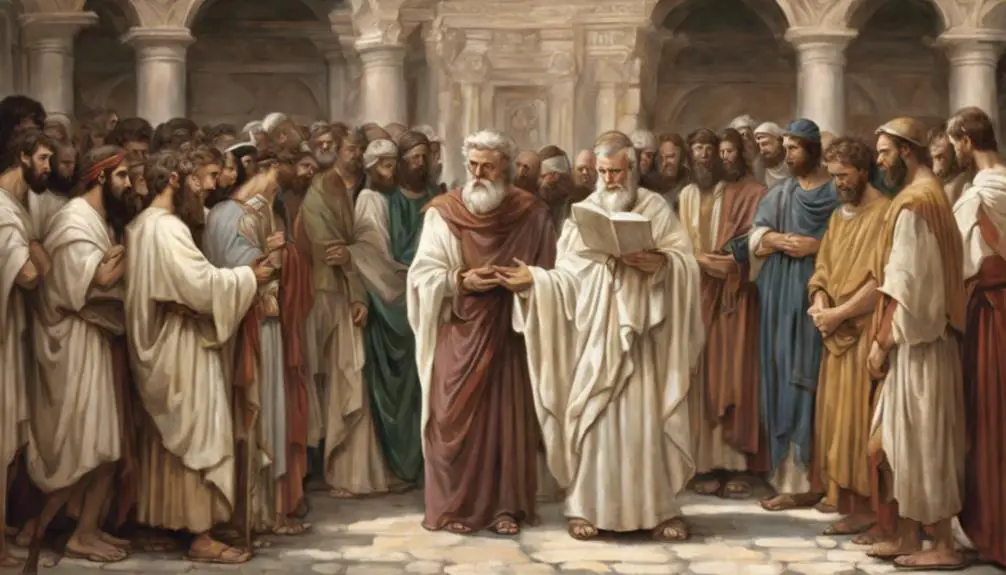Follow Onesimus' transformative journey from slavery to brotherhood in Christ, uncovering profound implications for contemporary faith and forgiveness.

A Study of Onesimus in the Bible
Peeling back the layers of the biblical narrative like an onion, you'll uncover the intriguing figure of Onesimus. This character, while minor, offers a compelling tale of redemption and transformation in the New Testament.
Have you ever wondered about his journey from slave to beloved brother in Christ? What might his story tell us about the early Christian community and our understanding of forgiveness and second chances?
Is it possible that his life holds profound implications for contemporary faith? Your curiosity might just be the key to unlocking these mysteries.
Key Takeaways
- Onesimus's journey from slave to Christian advocate encapsulates the transformative power of faith.
- His conversion serves as a model of repentance, demonstrating personal and moral growth in Christianity.
- Theologically, Onesimus's story underlines Christian doctrines of redemption, love, and radical inclusivity.
- Onesimus's life and legacy played a significant role in promoting social equality and anti-slavery stances in early Christianity.
Historical Context of Onesimus

Diving into the historical context, you'll find Onesimus was a significant figure in the New Testament, particularly during the first century AD, where societal norms and religious beliefs played pivotal roles in shaping his narrative. As a slave, his life was heavily influenced by the prevailing socio-cultural dynamics. The first century AD was characterized by a complex and hierarchical socio-political structure, with slavery being an integral part of it. Onesimus' experience offers an insight into the trials and tribulations faced by slaves during that period.
His story is also reflective of the changing religious landscape of the time. Early Christianity was still finding its footing, and Onesimus' conversion to the faith became a part of its growth narrative. The spread of Christianity wasn't always welcomed, and those like Onesimus who embraced it often encountered resistance, sometimes even persecution. In this context, he stands out as an example of courage and faith.
Onesimus in the Book of Philemon

In the Book of Philemon, you'll encounter Onesimus not just as a slave, but as a changed man who embraced Christianity, symbolizing the transformative power of faith. The narrative revolves around Onesimus's transformation, his relationship with Philemon, and Paul's influential role.
To help picture the significance of Onesimus's journey, consider the table below:
Stage |
Description |
Significance |
|---|---|---|
Slave |
Onesimus starts as Philemon's slave |
Shows the social hierarchy and Onesimus's initial condition |
Fugitive |
He runs away, ending up with Paul |
Highlights the turning point in Onesimus's life |
Convert |
Embraces Christianity under Paul's guidance |
Marks the spiritual transformation |
Brother |
Returns to Philemon not as a slave, but a brother in Christ |
Illustrates the change in their relationship |
Minister |
Tradition suggests he later becomes a bishop |
Indicates the potential of transformation through faith |
Each stage represents a critical point in Onesimus's life, revealing the profound influence of Christianity. This cyclical journey from slave to fugitive, convert, brother, and finally a minister showcases the transformative power of faith, ultimately leading to a redefined identity for Onesimus.
Interpreting Onesimus's Conversion

Through the lens of Onesimus's conversion, you'll see a profound illustration of faith's transformative power, a change that transcends social and personal boundaries. This transformation isn't just about Onesimus's shift from a slave to a beloved brother but also his spiritual journey from being a non-believer to a fervent follower of Christ.
Diving deeper into the biblical text, you'll find that Onesimus's conversion is a testament to the power of personal encounters with faith. His encounter with Apostle Paul, a spiritual mentor, played a pivotal role in his conversion. This suggests that faith isn't a solitary journey; it's fostered through relationships, mentorships, and community.
However, it's critical to note that Onesimus's conversion isn't an immediate, overnight change. It's a process, a journey filled with challenges and growth. This mirrors the experiences of many individuals who convert to Christianity, highlighting the authenticity of his story.
Moreover, the fact that Onesimus voluntarily returned to his master, Philemon, post-conversion reveals a change in his moral and ethical perspectives. His conversion led to a reformation of character, presenting him as a model of repentance and reconciliation.
Theological Implications of Onesimus's Story

Onesimus's story, while rich in personal transformation, also carries profound theological implications that further illuminate our understanding of Christian doctrine. You see, his journey from runaway slave to beloved brother in Christ offers a vivid illustration of redemption, a cornerstone of Christian theology.
Onesimus's return to Philemon, encouraged by Paul, highlights the transformative power of Christ's forgiveness. His past transgressions no longer define him; rather, he's seen in a new light, embodying the Christian belief that anyone, irrespective of their past, can be redeemed.
Consequently, Onesimus's narrative challenges societal hierarchies. In his letter, Paul doesn't just plead for Onesimus's forgiveness; he asserts that in Christ, there's no longer slave or free. This radical equality, as presented in Galatians 3:28, is brought to life vividly through Onesimus's story, underscoring the radical inclusivity of Christian doctrine.
Moreover, Onesimus's transformation offers a practical demonstration of 'agape' love, the selfless love of one person for another, irrespective of their status. This love, integral to Christian ethics, is exemplified by Paul's advocacy for Onesimus and Philemon's acceptance of him.
In essence, Onesimus's tale isn't just a historical account, but a theological exposition of redemption, equality, and love.
Onesimus's Legacy in Early Christianity

As we delve into early Christian history, you'll find that Onesimus's impact reaches far beyond his personal transformation, shaping the development and understanding of the faith. His story, as chronicled in Philemon, serves as a powerful testament to the transformative power of Christianity, propagating the idea of social equality among its followers.
Onesimus's life, from a runaway slave to a valued church leader, becomes a cornerstone for early Christian communities. His transformation underscores the principle that in Christ, social status ceases to determine an individual's worth. It's a radical notion, considering the societal norms of the time. You'll see that Onesimus's legacy, therefore, is key in the early church's anti-slavery stance.
Furthermore, his relationship with Paul is pivotal. You'll notice that their bond exemplifies Christian fellowship and transcends societal constraints, fostering a sense of equality and mutual respect. This relationship undoubtedly influenced the early Christian community, promoting a culture of acceptance and inclusivity.
Onesimus's legacy isn't merely as a transformed individual, but as a catalyst for change in early Christianity. His life story, embodied in the Epistle of Philemon, continues to inspire Christians, reinforcing the faith's core values of equality, transformation, and fellowship.
Conclusion
Onesimus's story, as narrated in Philemon, offers a profound look at conversion and Christian brotherhood. His transformation, from a slave to a beloved brother, challenges societal norms and advances the Gospel's radical message of equality. The theological implications of his story still resonate today.
Onesimus's legacy, therefore, is more than just historical; it's a timeless testament to the transformative power of faith.



Sign up